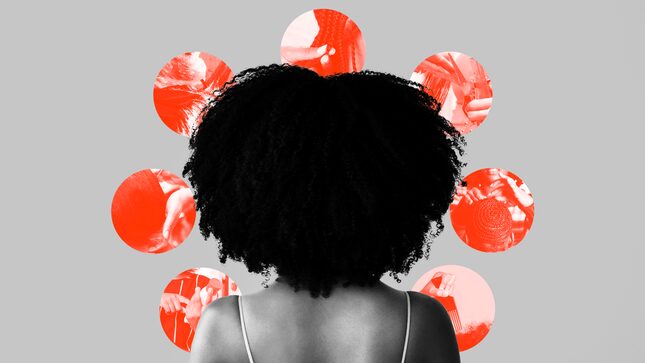How Salon Shutdowns Are Disrupting Black Women's Haircare
Latest
Illustration: Elena Scotti (Photos: Getty Images, Shutterstock)
On March 23, just after Ontario, Canada declared non-essential businesses would be closed in an attempt to slow the spread of covid-19, a 20-year-old student named Racquell Fogah tweeted her dismay: “The beauty supply store isn’t considered an essential service?????” She followed that up with another tweet: a clip of Ms. Juicy from Lifetime’s Little Women: Atlanta asking a fellow cast member, “What the hell we gon’ do now?”
Fogah’s viral tweet was made somewhat in jest. But while health is a priority over one’s hair upkeep, there’s a kernel of sincerity in her panic that speaks to the importance of black hair, which has always represented not only aesthetics, but broader cultural and emotional significance. The drive to look “groomed” is informed by both racist beauty standards and the sincere pleasures that are derived from styling and maintaining a particular hairstyle. Black hair can be political, it can be mundane, it can be glamorous, and the sheer scale of styles that can be rendered from it have resulted in a massive industry, one worth $2.5 billion by conservative estimates, including chemical relaxers, braiding services, and all the other products and professionals necessary to give black women their desired looks. Yet due to covid-19, salons have been forced to close along with local beauty supply stores, leaving black people across the country to rely on their own varied skills to maintain their hair for an indefinite timeline.
In my own mad rush to procure some basics before more strict social distancing measures were put in place in New York City, I stocked up on a massive tub of conditioner, leave-in spray, and a couple of deep conditioner packs that I knew my natural hair would desperately need in the weeks to come. As I stood in the drugstore aisle, next to the modest section quartered off for “ethnic hair,” I made a mental note to look for the portable air-drying bonnet that my mom sent to me years ago that I never got around to using; no better time than now, I figured. I wondered how many other black women, like me, were frozen in front of a colorful tower of black hair care, cursing themselves for not scheduling a last-minute appointment at the braid shop.
Black hair is a big deal, and how black women navigate the months ahead is guaranteed to be a seamless transition for some and a wild ride for others.
When people on social media discuss beauty procedures during this crisis, hair care has been written off as either frivolous (How could you possibly think about your hair in the midst of a plague?) or a time for whimsy (cut some bangs in the sink, rock a cool girl mullet, and keep it moving). But these scenarios exclude black women from the picture. This might be difficult for the messy bun brigade to understand, but for black women, neglect and a lack of maintenance can lead to breakage and hair loss. Black women maintain hair routines not only to keep their preferred styles looking fresh, but to make sure their hair doesn’t go haywire along the way. An extended period of time away from their trusted hairdressers and reduced access to their local beauty supply sets black women up for an added layer of stress during a period already marked by complete uncertainty. Black hair is a big deal, and how black women navigate the months ahead is guaranteed to be a seamless transition for some and a wild ride for others.
But over the weekend, actress Gabrielle Union-Wade made the case for covid-19 as a time of renewal. Union-Wade, who usually wears braids, posted a video of herself running her hands through her short, natural locks with the caption, “When your natural locks appreciate the lock down.” The next day, she posted a photo of herself with her baby in tow, both rocking mini afros. “Now mom & baby both rocking their natural curls,” Union-Wade wrote, with the hashtag #QuarantineNaturalHairChronicles.
“I am one of those people who doesn’t do my own hair,” said Charlene Carruthers, a writer based in Chicago. “My hairstylist, I’m faithful to her. She takes care of my hair for me.” When we spoke, Carruthers was getting ready to take out her braids and set course for an indefinite length of time without the skilled hand of her hairdresser, Brenda Johnson-Castillo. Illinois, too, has mandated that all non-essential businesses—such as salons—close up shop due to covid-19.
A few weeks ago, when the United States finally received its covid-19 wakeup call, Carruthers dropped by a beauty supply store and bought hair products for the first time in years. “I said to myself, ‘This thing might really turn left, and I might not be able to go to my hairstylist,’” she told me. “I didn’t even know what to buy.”
For Carruthers, having a dedicated hairstylist was a way to ease her busy lifestyle and support black businesses. She could either spend half the day doing her hair, or spend an hour or two at the hairdresser instead and help another black woman put food on the table.
-

-

-

-

-

-

-

-

-

-

-

-

-

-

-

-

-

-

-

-

-

-

-

-

-

-

-

-

-

-

-

-

-

-

-

-

-

-

-

-








































